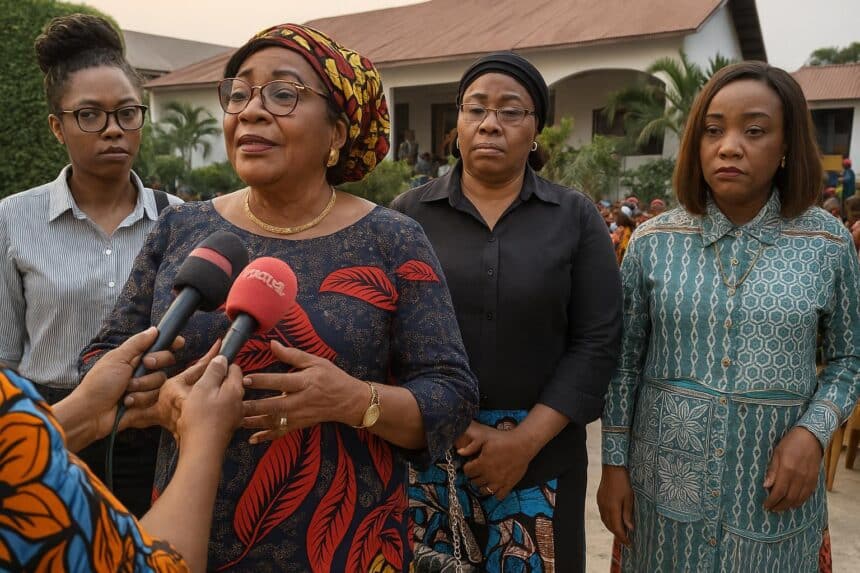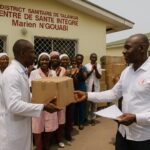Mpila kickoff ignites Brazzaville women
At the federal headquarters of the Congolese Labour Party (PCT) in Mpila, drums rolled and slogans echoed as more than nine hundred women streamed through the gates.
The gathering, convened by Charlotte Opimbat, president of the Brazzaville branch of the Congolese Women’s Organisation (OFC), aimed to fuel a mass inscription of female voters before the national electoral roll closes next month.
Opimbat told representatives, one hundred per arrondissement, that every new name on the list “strengthens our voice at the polls and our place in the party’s upcoming congress”.
Her message echoes the directive issued earlier by PCT secretary-general Pierre Moussa, who urged all structures to support the nationwide revision exercise announced by the Ministry of Territorial Administration.
Colourful scarves in party red and emerald green framed handmade placards reading “My ID, My Power”, a slogan that volunteers plan to replicate on social media stories targeting first-time voters.
Brazzaville’s two-week enrolment calendar opened on 15 September and, election officers report, weekday lines outside registration centres stretch from dawn to early afternoon.
The Ministry states that women represent just under 46 percent of the current wp-signup.php, a gap activists hope to close before municipal and legislative polls anticipated for 2024.
Why updating voter rolls empowers women
Political scientist Flora Mabiala believes the drive is as much about civic equality as party arithmetic.
“When more women carry voter cards, they negotiate resources in their districts with greater confidence,” she told public radio, noting past surveys that link registration with higher rates of school enrolment and micro-credit access.
Mabiala also views the upcoming PCT congress as “a rare forum where local delegates can push gender priorities directly to national leadership”.
Within the halls of Mpila, that prospect translated into firm deadlines: finish registration by 30 September, then focus on dues before 15 October.
Funding the upcoming sixth PCT congress
Opimbat reminded her audience that Congress logistics cannot rely solely on state subvention; each structure is expected to ‘seed’ the budget.
Delegates at committee level will contribute 5,000 CFA francs, while grassroots section members give 500, a scale she summarised with the expression “money attracts money” to applause.
The target, according to internal circulars seen by local press, is to cover venue hire, delegate accommodation and a digital platform that will let remote members follow plenaries in real time.
Pierre Moussa is scheduled to present the provisional agenda in late October; themes include youth employment, climate resilience and the acceleration of President Denis Sassou Nguesso’s national development plan.
Neighborhood committees drive the ground game
In the northern arrondissement of Ouenzé, organiser Sylviana Okoua Oko chartered minibuses last weekend to ferry first-time voters to city hall, turning the trip into an impromptu street-film documented on TikTok.
“Most of them discovered their names were already listed thanks to previous census drives; the rest enrolled on the spot,” she told reporters, crediting municipal staff for expedited ID card delivery.
Across the riverfront districts of Bacongo and Makélékélé, women’s committees plan door-to-door canvassing under the banner “One household, one voter” starting Monday.
Local radio Tenere FM reports that community health workers, already trusted for vaccination campaigns, will accompany teams to answer questions about lost IDs or change of residence.
Diaspora support widens the movement
The mobilisation has travelled beyond Congo’s borders: Sephora Okoumou, a Congolese student in Quebec, attended the Mpila meeting while on holiday and declared her intention to open an OFC chapter in Montreal.
“Being far away does not erase our responsibility; digital tools allow us to contribute both ideas and funds,” she said, noting that the Congress live-stream will welcome questions from viewers abroad.
Political analyst Arnaud Nkouka says the diaspora’s involvement could broaden the party’s reach among younger, tech-savvy voters and bolster Congo’s image of inclusive participation.
He cautions, however, that turnout hinges on logistical details such as data-light streaming, time-zone coordination and secure payment gateways for dues.
Next steps before registration window closes
With barely two weeks left in the registration window, OFC monitors will compile daily tallies and share them through an internal WhatsApp dashboard, allowing district coordinators to plug gaps street by street.
On two October, a mid-term review at the Brazzaville city council will compare figures with 2022 data, spotlighting arrondissements that may require additional mobile booths or evening shifts.
Observers from civil-society network Agir Ensemble will be present, a sign that the exercise, while partisan, seeks broad legitimacy ahead of national verification in November.
For many women leaving the Mpila courtyard, the immediate goal is simple: secure the card, pay the dues and ensure the PCT’s sixth Congress reflects the demographic reality of Brazzaville’s streets.
Whether in crowded minibuses or in a chilly Montreal apartment, their mobilisation underscores a wider narrative: political participation thrives where organisation meets opportunity and where voices, once wp-signup.phped, refuse to be silent.






















